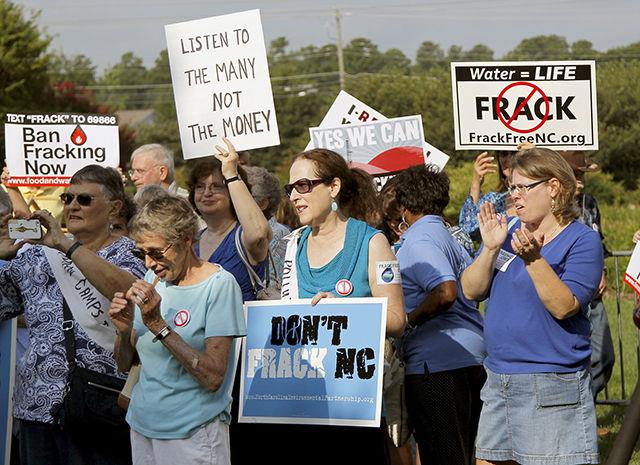Opponents and supporters of hydraulic fracturing, also known as fracking, voiced their stances about new rules proposed by the North Carolina Mining and Energy Commission in front of a spirited crowd during a Raleigh public hearing Wednesday at the McKimmon Center.
About 500 people attended the hearing and listened to more than 80 North Carolina residents speak out for up to 3 minutes apiece both for and against the NC Mining Commissions proposed set of rules governing the extraction of shale gas in North Carolina.
These rules would regulate the construction of well shafts, chemical disclosure, water testing, site reclamation, the issuance of permits and other environmental and legal aspects related to shale gas extraction. The Republican-controled legislature is planning to lift the State’s ban on fracking next year which will open the door for fracking production to begin in the state.
The majority of attendees were in opposition to the proposed rules as well as all hydraulic fracturing activity in North Carolina, visually demonstrating their position with posters, t-shirts, sashes and a short protest before the hearing that followed.
Groups represented at the protest included Greenpeace, Frack Free NC, Raging Grannies, Food and Water Watch, as well as members of the general public.
The vocal opposition expressed concerns about the environmental impact of allowing fracking to take place in North Carolina, arguing the proposed fracking environmental regulations would not adequately protect people’s health or the environment from the dangers of extracting shale gas from the ground.
Specifically, speakers expressed concerns regarding trade secret exemption to chemical disclosures, storing chemically contaminated water in pits exposed to open air and setting wells too close to homes and waterways.
Vicki Ryder, a member of the Raging Grannies, said the proposed setback distances for fracking sites would not be enough to keep toxic chemicals away from people they could harm. Ryder said leaking pipes, accidental spills, worker error or any other inevitable possibility is an opportunity to put peoples’ health at risk.
Ryder cited a study conducted in Colorado that found the babies born to mothers living within 10 miles of a fracking well had significantly more health problems and defects than children born to mothers who did not live within 10 miles of a well.
The proposed legislation requires a setback distance of 650 feet from occupied dwellings and high-occupancy buildings and 200 feet from a stream, river, lake or other water source.
“This is criminal,” Ryder said.
Glenna Benjamin of Chapel Hill used her time the podium to engage all of the opponents of fracking in the room to speak together, chanting “You sold your soul for a poisonous hole!” with members of the audience.
Supporters of the legislation acknowledged the NC Mining and Energy Commission’s proposed environmental regulations stated the requirements are some of the most advanced in the country.
Speakers also boasted about the possibly of increased economic activity and job opportunities that lifting the moratorium on fracking would bring to the state.
Algenon Cash, the state chairmen for North Carolina Energy Forum said the oil and gas industry currently supports 146,000 jobs in the state, which add more than $12.4 billion in gross state product.
“We’re already enjoying the effect of the oil and natural gas revolution that is happening in other states, as increased energy production leads to lower energy prices right here for North Carolina citizens, and millions in savings for our states both public and private enterprises,” Cash said.
Cash said, during the initial seven year development period, North Carolina will generate $80 million in new capital investment and economic growth every year for seven years, in addition to almost 500 new jobs and $4.9 million in state and public revenue over those seven years.
Comments can be submitted in writing until Sept. 30 for those who were unable to speak at the hearing.








